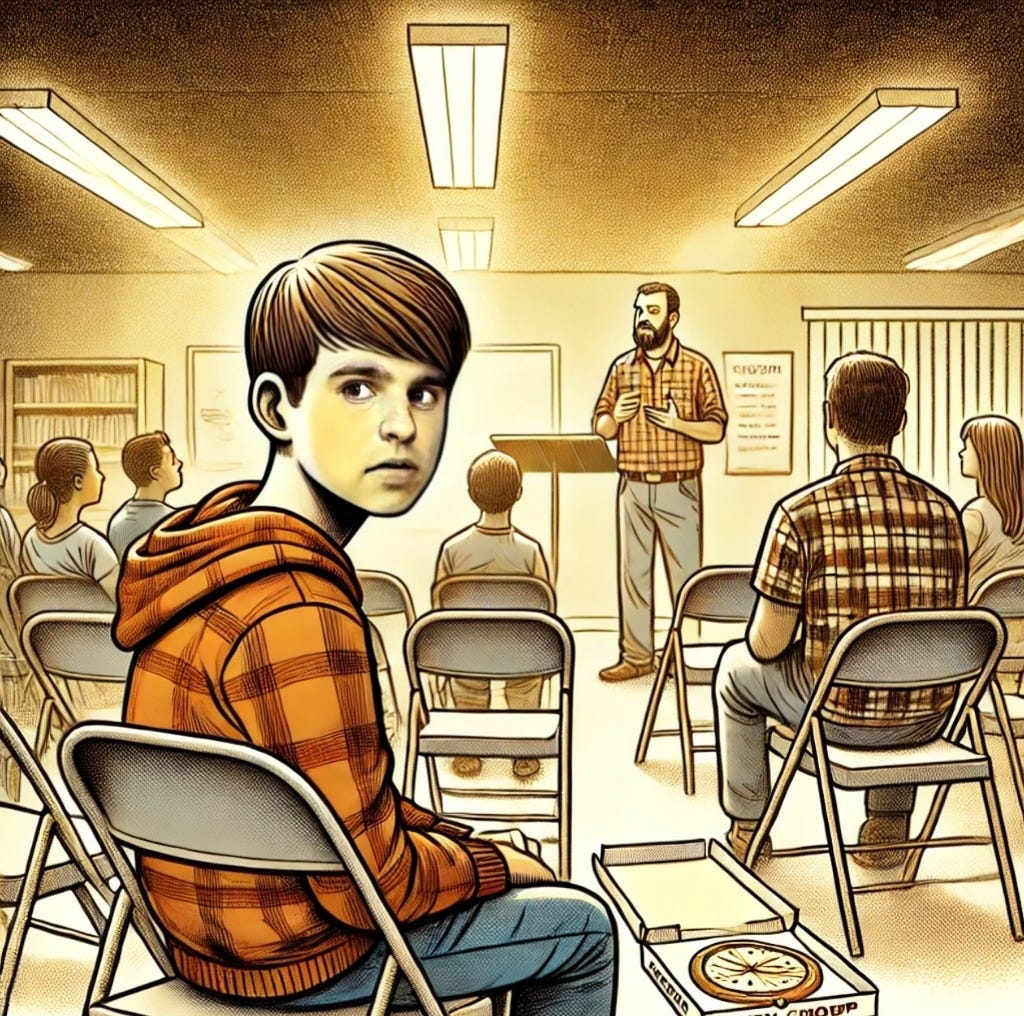Faithless Lessons
Toward a Shared Human Ethos
When I was thirteen, my neighbor Garett invited me to attend a youth group meeting at a local Lutheran church in Glendale. He and and I used to play on Norton Avenue, along with my friends Eddie, Sean, and Jason. My family was more secular by nature—we rarely spoke about God, and the little I knew about religion came from history class and the occasional article I would come across. But my friend’s enthusiasm was infectious, and the promise of free pizza was enough to convince me to go.
The meeting was held in the church basement, where folding chairs were set up in a circle. The atmosphere was warm and inviting. A guitar leaned against one wall, and a small group of teenagers my age chatted while a youth pastor handed out slices of pepperoni pizza. For the first half-hour, we played icebreakers and laughed together, and I started to feel at ease.
Then, the youth pastor stood and began a lesson about salvation. He spoke with an intensity that held the room captive, his voice rising and falling like a tide. At first, I was intrigued. He painted a picture of a loving God who offered eternal life to those who accepted Him. But soon, his tone darkened as he described the fate of those who refused to believe. He spoke of hellfire, eternal torment, and separation from God.
I remember shifting uncomfortably in my chair, looking around the room to see if anyone else felt as uneasy as I did. My friend sat quietly, nodding along, seemingly unfazed. My mind raced with questions: What about people who had never heard of this God? What about followers of other religions? When I raised my hand to ask, the pastor's response was swift and unyielding—only through Christ could anyone be saved.
That night, I left the church feeling conflicted. I couldn’t reconcile the idea of an all-loving God with the concept of eternal damnation for those who simply didn’t believe. The experience planted a seed of doubt that would grow into a broader critique of organized religion as I got older. While I would eventually reject the supernatural claims of faith, that night marked the beginning of my journey to wrestle with the philosophical and ethical questions religion raises—and the enduring values it tries, however imperfectly, to express.
As I've matured, I’ve come to see that even the traditions I critique contain valuable philosophical lessons worth exploring.
Muslim Tradition: Submission as a Path to Harmony
Islam’s core tenet, tawhid (the oneness of God), underscores the importance of unity—not just with the divine but with humanity and the cosmos. As an antitheist, I reject the divine premise, but there is profound wisdom in the principle of submission. Submission, when untethered from authoritarianism, can be understood as humility before the larger forces of nature and the interconnectedness of life. Islam's emphasis on communal prayer and shared rituals highlights the value of collective human experience. The month of Ramadan, for instance, teaches discipline and empathy through fasting—a lesson in self-restraint and in understanding the hunger of others.
What an antitheist can glean from Islam is this: submission need not mean subjugation to a deity but rather an acknowledgment of our limitations as individuals and the strength we find in community. It’s a call to transcend ego and embrace cooperation.
Christian Tradition: The Radical Philosophy of Love
At its heart, Christianity offers a revolutionary idea: unconditional love and forgiveness. The teachings of Jesus, particularly the Sermon on the Mount, resonate as moral imperatives even outside a religious framework. "Blessed are the peacemakers," "Turn the other cheek," and "Love your enemies" are profoundly challenging principles. For someone who views religion as a construct, these ideals represent the potential for moral courage and selflessness.
The antitheist critique of Christianity often focuses on its history of hypocrisy and violence—crusades, inquisitions, and colonialism. Yet, these are human failings, not necessarily failures of the underlying philosophy. When stripped of its supernatural claims, Christianity offers a roadmap for moral growth through compassion, forgiveness, and an unwavering commitment to the dignity of others.
Jewish Tradition: Questioning as a Sacred Act
Judaism, with its millennia-long tradition of debate and interpretation, embodies a spirit of intellectual inquiry. The Talmud is less a set of rigid rules and more a collection of arguments, showing that questioning is not only allowed but encouraged. The Jewish concept of tikkun olam—repairing the world—shifts the focus from awaiting divine intervention to taking responsibility for human suffering.
From an antitheist perspective, this tradition is particularly valuable. If there is no God, as antitheists contend, then humanity bears the sole burden of ethical responsibility. Judaism's emphasis on action, charity, and the relentless pursuit of justice provides a framework for addressing the existential weight of a godless universe.
Synthesis: Extracting the Philosophical Core
Taken together, the Muslim, Christian, and Jewish traditions offer a triad of philosophical values: unity, love, and responsibility. These values are not inherently religious—they are human. Religion packages them in myth and ritual, but their essence transcends belief.
For the antitheist, the challenge is to decouple these lessons from their theological contexts and integrate them into a secular worldview. How can we foster the communal harmony of Islam without invoking divine command? How do we embody the radical compassion of Christianity while rejecting its claims of exclusivity? And how do we embrace the relentless questioning of Judaism while freeing it from the confines of orthodoxy?
Toward a Shared Human Ethos
Religion, at its worst, divides. It creates hierarchies of belief and fosters intolerance. But at its best, it captures humanity’s yearning for meaning, connection, and purpose. As an antitheist, I see no need for gods to access these values. Yet, by studying the religious traditions that have shaped human civilization, I am reminded that the search for transcendence—whether through submission, love, or questioning—is not the property of faith alone. It is a shared human endeavor, one that calls us to be better, not because we are commanded to, but because we can.







